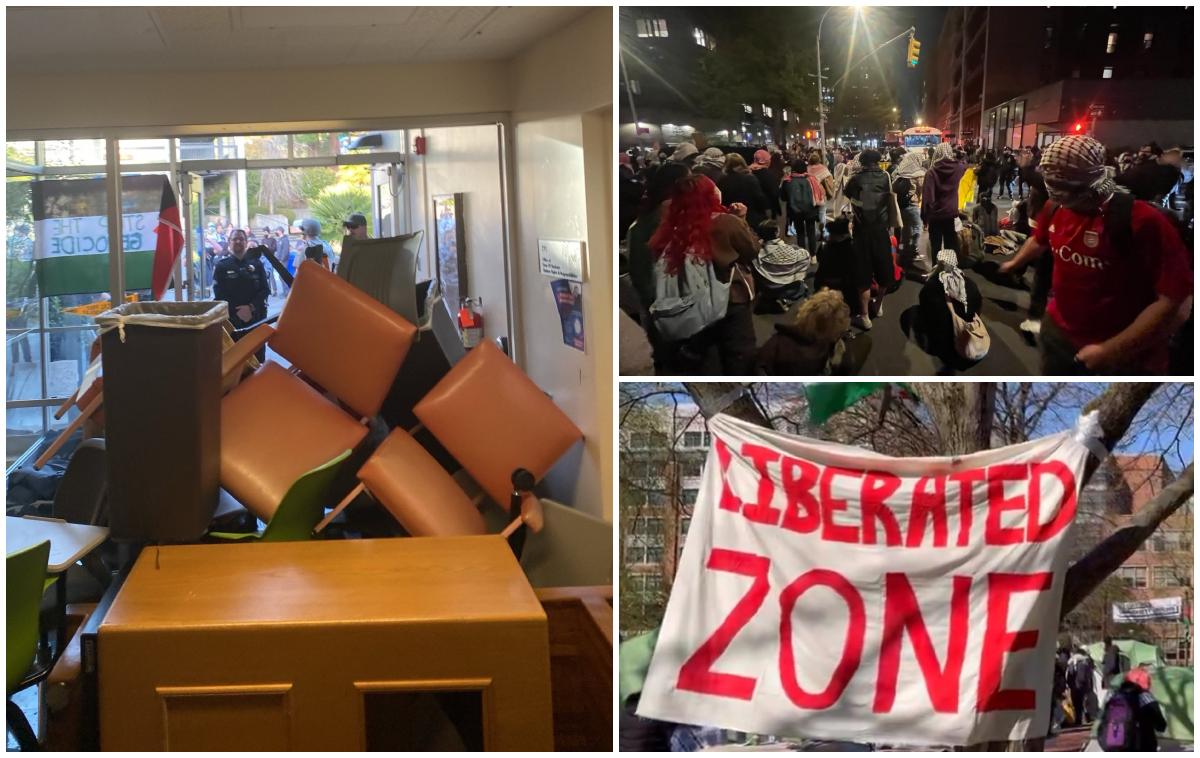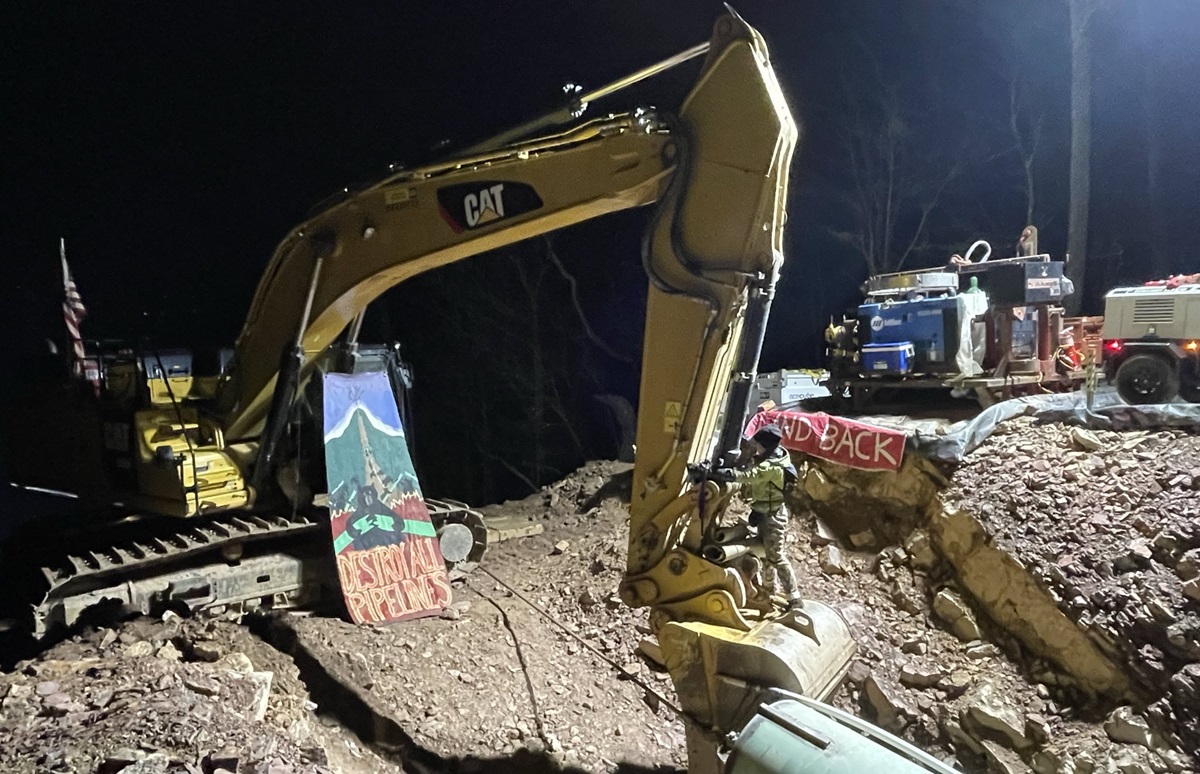Filed under: Analysis, Anarchist Movement, Anti-Patriarchy, Capitalism, Featured

A look at the impact of neoliberalism on social reproduction and how a revolutionary feminism movement might approach caregiving.
If the pandemic and the recent racial justice uprisings have taught us anything, it’s that direct action gets the goods. Black Lives Matter organizers may not have gotten all of their demands, but what we have seen is that applying pressure works wonders. Rather than passively waiting for politicians to look deep into their hearts and see our humanities, all actions whether peaceful or forceful are a threat if they challenge traditional production or business as usual. Bodies need to be in the streets and new theories must be born. While we averted another trainwreck from the Republican Party, the Democratic Party is back with their status quo must stay policies. No matter how many women and black faces they put in high places, representation removed from broader transformative demands only serves the interests of empire. Public outcry will continue to build if the people are not being heard. In America, Feminism 101 is over.
American feminism is not removed from imperial neoliberal agendas with its recent pleas to move more women into the brute upper hierarchies of the military and positions of power. The historical amnesia of Americans is shocking. The military is one of the biggest proponents of rape culture within its ranks and through acts of war against foreign subjects. Women are the biggest casualties and victims to our military empire domestically and abroad. American feminism holds true to limited liberal frameworks of where power is built. Power in American feminism is not built in our schools, workplaces, neighborhoods, or environments. Women’s power can only be built in governance and corporatism. American imperial feminism continues to construct feminism’s role as a handmaiden to capitalism, a terrain where the job of handling exploitation and oppression is shared and divided equally by elite ruling women and men. It is about who is best for sitting at the capitalist table and creates a vision of equal opportunity domination. This framework asks everyday people, for the purpose of feminism, to be thankful that it is a woman who orders the next drone strike on their village.
While the Me Too movement has led to significant impacts in its take down of powerful wealthy men in the media and government, American feminists have been politically traditional compared to other nations. Feminism in the United States has been unable to commit to contemporary social movements that are discussing systematic change like Black Lives Matter, Extinction Rebellion, the Sunrise Movement, and the anti-ICE immigrant led mobilizations. U.S. feminism has also been unable to organize on a grassroots level, specifically around every day needs. The Women’s March has become the most pronounced expression of U.S. feminism, representing subjectivation through the caricature of “boss” and promoting the politics of establishment Democrats. It is essentially weak because it has not developed a politics for women of the 99%.
American feminists do not view patriarchy, white supremacy, and capitalism as interchangeable or romantically linked. The Time’s Up movement accentuates a particular type of feminist power. A power that demands change within the limits of government and individual achievements. We must recognize the importance of U.S. feminism’s ambition to eclipse the differences between survivors of gendered violence, but the Lean In strand of feminism produces elitism, that seeks equality with men and women of the same white upper class. It does not probe into queer theory, trans liberation, nor does it assess society’s oppressive gender binary. It works to preserve cis-capitalist social relationships, professionalize political organizing, and promotes crippling individualism. The extremely individualistic society we live in has the tendency to atomize collective problems. We see this in the psychologization of sexual abuse. It is easy to look at the issue of rape culture as individualized incidents. We are quick to sympathetically look at other nations who experience rape culture as a “Third World” problem, ignoring the truth that rape culture is incredibly strong in the United States as well. Nevertheless, the dominant culture is quick to name singular incidents as ‘cis men with a psychological problem,’ instead of analyzing a patriarchal system that rapes and murders trans people, women, queer, and gender non-conforming people.
*Text of the Week*
An interview with @GothBotAlice from This Week in Fascism on @IGD_News on how to fight the system that tries to annihilate us, while taking care of one another so we don't absorb the patterns of that system and destroy ourselves.https://t.co/9cHOF5v2Ri— PeterGelderloos (@PeterGelderloos) October 8, 2021
The American feminist movement contains women and queer people who are attempting to challenge and even bring down the system that bolsters white supremacy and patriarchy, but the United States lacks an organizational base to counter the over-representation of the Democratic Party. Capitalist liberal discourse, state legitimacy, the mainstream media, and the hegemonic social conditions of public life generally go unquestioned and unchallenged. Discourse around reproductive care, socio-economic inequality, and abortion rights are driving public debates on patriarchy and gender. American feminists have begun to talk about gender oppression and have made historic strides towards gender equality. However, women in the U.S. are politically cautious. They are only willing to fight for narrow reproductive rights they have already gained and for a little class mobility. With the recent Texas anti-abortion law and the attacks on trans rights, it’s become clear that we are experiencing a roll back of our hard won concessions. U.S. feminists and radical queers have the potential to push for far more expansive and bold objectives.
American feminists seem to ignore that the prison industrial complex, military industrial complex, and U.S. foreign policy have made lives significantly worse for women internationally and at home. Justice for crimes of rape and assault is tied to carceral feminism as the only solution. The demands are that abusers need to be “put to justice” through incarceration and the fortitude of the state. The state cares little for transformative justice and changing gender oppression, but rather seeks to preserve these dynamics. Policing has been named as a “public service” or a form of community care, when for the most part, police are mainly effective at responding to theft in affluent neighborhoods and public disturbances in affluent neighborhoods. They do little to “catch” abusers and abusers are never prosecuted.
Nevertheless, we should become vigilant in our opposition to punishment and prisons as the sole vehicles to deal with social ills. Crime is a complex tricky thing, at times it’s misdirected energy, often times it’s tied to social and economic limitations. All violence is rooted at an institutional level and our prison population is filled with young people of color locked up on petty drug offenses and crimes of survival. American feminists have not adequately begun to dissect this racial intersection of justice for victims, and the political construct and even delusion of crime in America.
The Gender Class Intersection
Although equal pay for women is an adequate and reasonable goal, it has been next to impossible to achieve. Where does race play a part in this desire, when the demands for wealth equalization have mainly been pushed by white women seeking to equalize their wealth with upper class white men. The Glasgow cleaning workers strike of 2017 sought to address this issue. The Glasgow strike was led by female cleaning workers seeking to address workplace exploitation, division in pay, sexual assault, and better working conditions. Cleaning workers are majority women across Europe, Latin America, and the United States. Not long after the Glasgow strike, Google employees from different parts of the world also left their workstations in protest responding to a set of discoveries published by The New York Times. The Times published revelations on sexual harassment perpetrated and covered up by Google’s upper management. Key players in the digital empire like Facebook, continue to wear masks of liberalism and progressive capitalism as employers who exploit with equal domination. The actions against Google were not limited to harassment but also demanded trade union protections and rights.
The 2018 Teachers’ Strikes in the United States was one of the biggest strike mobilizations in recent American history that rekindled labor activity. This strike spread to more than ten states, and women now make up more than 70% of the U.S. teacher workforce. The Amazon workers strike was a direct continuation of Black Women’s Lives Matter, where women of color led the charge against the biggest corporation that has ever lived. The return of the strike has revealed working class women as protagonists and instigators. In Latin America, “la huelga feminista” – the feminist strike is a completely new development. Latin American feminist strikes have adopted past labor movement tactics while focusing on gender oppression and social reproduction.
For the past two years, Covid-19 has exacerbated the issue of social reproduction. Domestic violence and women’s unemployment levels are at an all time high. Healthcare workers have become the sacrificial healers keeping people alive, not to mention women in the United States make up almost 90% of the medical workforce. Essential work and care are inextricably tied to women’s place in America. During this pandemic, poor and working class women are being overburdened, and forced to step up more than they ever have before. They are losing their jobs at higher rates and losing their historical strides. Our imposed social-political role of caregiver is becoming unbearably fixed.
Social Reproduction
From Marx’s Capital, the theory of exploitation, and the extraction of profit and surplus value is useful to understanding women’s social reproduction. The extraction of surplus value for profit is done through the economic machine that makes workers work longer hours in order to make capital for the bosses. Marx also explains that this machine functions in order for the workers to live. At the beginning of this process, the workers had to be separated from their means of living. This process according to Marx, was done violently, and the development of colonialism and slavery were needed to foster conditions for capitalism to flourish.
If we all had access to reproducing our own lives such as making our own food, mutual healthcare, and so on, then people would not have to work for their bosses. The violent tearing away of the workers from the means of sustaining themselves, is the reason why workers must sell themselves through any skill (physical, intellectual, reproductive) and become dependent on capitalists. Wage slavery for capitalism is not a natural phenomenon, one must be made and forced into this process. Certain capacities and skills are emphasized, revered, de-emphasized, and disregarded in order for people to become workers. What is often forgotten, is that people go to work in order to live, and wage work intervenes between the human being and their own life-making. The distinct division between life-making (social reproduction) and profit-making (production) is indispensable to capitalism. This is why workers fight for the wage because it is not for the wage itself, but what the wage can achieve which is life.
When conditions of life worsen for working-class people struggle erupts. This is the foundation for a materialist theory of crisis and transformation. Crisis threatens life as we know it. Bourgeois understanding of politics trains us to think we have control over our lives by the trappings of bourgeois democracy, where a person votes once every four years to enact change. There is a direct and discreet separation between social life and political life. Part of this crisis is that while swaths of the population believe they have the right to vote, this right obscures the fact that neoliberalism has steadily decreased control over social life. A part of the answer to the political crisis is that we seek to regain control over our social life. It is not only suffrage that women want extended, but more control over how we lead our lives.
The lesson of these strikes goes beyond the need to break with union bureaucrats and the Democratic Party, it goes beyond remembering the power of mass collective action and refusal. It's understanding that we can completely remake society along lines of mutual aid – not capital. https://t.co/1WvXUsET7a
— It's Going Down (@IGD_News) March 31, 2018
Capitalist production requires the social reproduction of itself, it must have stable dependent social relations to propagate itself. For example, capitalism needs a pliant workforce, preferably divided by all kinds of race, gender, and sexuality-oriented divisions. Those social relations are what capitalism relies on for its continued existence. Also, capitalism produces commodities, but someone has to produce those products for capitalist profits to be realized. This is done by the working class, but the system also needs a reliable instrument for the reproduction of the working class and the reproduction of the class’s labor power.
The reproduction of labor power (life-making) and the production of commodities (profits) are united circuits. Both circuits go into the maintenance of the system, if one were to collapse then the other would collapse as well. For instance, in the early days of industrial capitalism, capitalism had no idea that there should be some limits to its greed. Capitalism ate up all the labor power it found available: men, women, and children. There are devastating descriptions of women and children who were found dead in one room where eight people would live together with no toilet facilities. This rampant greed at the start of capitalism was an actual threat to working-class life-making. Eventually, the capitalist state had to step in and regulate the system in order to not kill its main source of power. From here, one begins to see the regulation of daily hours and laws being passed to strengthen the working-class family.
Working-class women were ultimately sent into the home to monitor care inclined activities, and the male breadwinner emerged during the political economy of Victorian morality. It was never true that working-class women mainly stayed at home, especially in the case of black women in the United States, but the discourse was created that housework was women’s work. Black women throughout history and in general working-class women had to work long hours in the factories in order to make life-making possible, but they also had to do all the homemaking to make child-rearing possible. This is the relationship between life and production that capitalism obscures. It is the root separation of economic and political life from social life.
As capitalism naturalizes all social relationships, the relationship of the family is declared a trans-historical unit, where women have always given life in the more expanded sense. To the dominant ethos, is it not natural to imagine that they always will? Here lies the root of gender oppression or the bourgeois family. That is not to say there was no gender oppression prior to capitalism, but this is the specific form of gender oppression within capitalism. The efforts invoked by revolutionaries, feminists, socialists, and anarchists have always been to evacuate the house of all social reproductive functions. Demands for communal laundries, communal kitchens, and so on, become popular and needed, in order for our collective society to begin assisting the process of reproduction. This socialist demand would befar more efficient than the nuclear family or the woman taking up all the heavy work. While other countries have better social safety nets, the U.S. has women.
If we think about the concept of public kitchens, we should realize that they already exist, they are called restaurants, and yet only the wealthy can afford them. As feminists, we are essentially saying that there should be a public restaurant in every neighborhood, where community members have access to it. Housework is still the main issue in the 21st century, and un-collectivized work needs to be abolished. Like our feminist foremothers, we are still demanding “Bread and Roses.”
Caregiving
Our domestic and social work has been undervalued and alienated from its productive nature. Undeniably, capitalism has benefited from ignoring care. Apart from being a disaster in and of itself, capitalism thrives off of generating periodic crises. Not only does it live and flourish by exploiting traditional labor through wage work, but it also receives free rides on public goods, nature, and unwaged work that is needed to reproduce people and society. Capital inflates by helping itself to everything without replacement or catering to the management of its things, one example being a lack of adequate free healthcare for the workers doing the grunt of empire building. It is powerful to see feminism take on a 99% approach and begin to organize around popular issues such as healthcare. For the most part, the oppression of women has varied in all class societies, but capital has established new modes of sexist exploitation with the help of new institutional bodies. Its first immediate action was to divide the work of making people from the work of making a profit. The first job was delegated to the woman, then it was subordinated to the second job. This problem becomes more visible when we recall how difficult, vital, and complicated life-making is. This activity creates and sustains life and all life in a biological sense, but it also manages and nourishes our capacity to work. This means manufacturing people with the desired attitudes, skills, dispositions, abilities, values, and competencies. Making people work needs indispensable cultural and material pre-conditions for society, and for capitalism’s production. Without people-making work, labor power and life could not be embodied. In capitalism, the role of social reproduction is hidden and undermined. Rather than valuing it in its own right, people making is handled as a sheer means for generating profit.
As a mass #strikewave kicks off:
🏴offer solidarity: food, banners + child-care.
🚩support + expand conflictual + self-organized forms of action: from blockades to mutual aid.
🏴expand strikes into other sectors + into wider community.
🚩defend rank-n-file self-organization. pic.twitter.com/UBK2Z8SywN— It's Going Down (@IGD_News) October 14, 2021
Digging further into this dilemma of social reproduction, we must view the concept of care in a more political sense than we have normally understood care to be. We understand care to be individual care that individual caregivers give to the vulnerable and needy in our society. Neoliberalism has attacked the infrastructure of life-making. The very elements we need to reproduce our lives such as schools to educate us, hospitals to heal us, public parks that provide us with green spaces, and public transportation that allows us to easily and inexpensively roam. All of these basic infrastructures that make life-making possible were devastated, taken away, or definitively cancelled by neoliberalism. In this barren landscape of attacks on the idea and institutions of caregiving, care then emerges as a political practice. Every teacher who is fighting against school closure and every nurse who is fighting for personal protective equipment is actually doing their real work, and that is, trying to heal the injury of class. So in this context, it is a political phenomenon, and the crisis of care is beyond the diminution of public social infrastructures. It is a deeper attack on working-class life-making.
To regain control, we must understand care and caregiving as a politicized phenomenon. We should not be surprised that the majority of struggles erupting in the current context are battles for infrastructures of care. The battle for clean air, clean water, schools, parkways etc. Today during a global pandemic where is our people’s care over profit? Essentially care work is still feminized in language and politics, and thus women are leading the war against class society today. We have grown up to believe it is the mother who feeds, who heals, who teaches, and who nurtures at home. This cultural imposition on women has embodied a finite reality. Womanhood isn’t isolated to the home, but at the level of capitalist production, all healing inclined wage work (nursing, teaching, cleaning, and childcare) consists of a majority female workforce. At some point, the mess of capitalism must be cleaned up and the process of life-making must be valued and propagated above all falsities and objects.
There is also the building threat of climate change and the work of women becoming inextricably linked. Capitalism lives and grows by exploiting labor. Appropriation is a key process that has been neglected but it is as important as the issue of exploitation. Every day we see the appropriation of what is considered natural work. Natural work is the labor of Mother Earth and the social reproductive unpaid human labor (the work of women). Through neoliberalism, capitalism amplifies by commodifying the untouched and cheap natures of energy, raw materials, and compulsory/automatic work of life. The formation of value is occurring in two areas. The first area is exploitation. The second is appropriation. Exploitation is controlled by the labor relationship between the worker and capitalist. The “paid” wage work is extracted from laborers and the profiting of surplus-value. The area of exploitation is dependent on the area of appropriation. Appropriation involves all unpaid work or energy of extra-human, animals, and human entities. This doesn’t solely mean the work of racialized people, migrants, and women, it also means the labor of rivers, forests, and mountains. This energy or labor is always unpaid and extracted in a rape-like manner. As an anarchist and eco-feminist, Maria Mies describes it in her book, Patriarchy, and Accumulation on a World Scale, “it is the labor of women, nature, and colonies.” Capitalism cannot grow or be maintained without this constant, vigorous, and ever-rising appropriation of unpaid or social reproductive work. The amounts that can be extracted freely or at a low cost is what contemporary production commodification relies on. The main contradiction exists in the area of unpaid and paid work.
From pipeline blockades, wildcat + rent strikes, antifascist defense of our communities against the far-Right, mutual aid networks fighting wildfires + the pandemic + a country wide eruption against racist State violence – 2020 was a hell of a year. Here's to what comes next. pic.twitter.com/NZCpuxdefE
— It's Going Down (@IGD_News) January 1, 2021
Fossil fuel extraction acts as one example of an appropriation region, by cementing the labor of people and nature into an environmental simplification. Here we witness wealth at low costs, deriving from cheap exploited labor and rich appropriated resources. Under-reproduction is needed for capital by cutting subsistence needs of extra-human and human natures. Capitalism refuses to provide or pay for the imperative social needs and stratums of reproduction required to maintain the lives of those working, as well as the life forces that are creating resources. Under‐reproduction includes coercive under consumption, un-livable housing, wage suppression, unbalanced ecosystems, and as of today environmental destruction. The reproduction and accumulation crux is dangerous since it further impacts communities’ capacities to reproduce and socially reproduce. On occasion and on a superficial level, capitalism attempts to “fix” these contradictions, while also searching for cheaper commodities and aggrandizing accumulation. Capitalists and state apparatuses continue to identify, quantify, and measure extra-human and human nature for the purpose of increasing profits.
If we look at climate change as one of the forms in which crisis manifests itself, we see looming social, environmental, and political unrest on a global scale. If we as a society do not immediately adopt drastic mechanisms to confront climate change we are fundamentally saying yes to mass genocide, and as a society, we have moved drastically closer to midnight on the doomsday clock. The process of objectification and domination plays a key role in the capitalist Death Machine. Not only does capitalism objectify people, but it also objectifies all other entities on the planet. From extreme industrialization, deforestation, poaching, mining, factory farming, etc. The subordination of nature is a part of this objectification dynamic.
The United States is in the middle of a lucrative feud between party members who are climate deniers or who are proposing paltry policies for this impending peril. The current capitalist crisis is threatening life as we know it, it is no longer purely about oppression but about the continuation of all life and ecosystems. Climate change is the expression of human’s separation from nature, in order to dominate it for profit. This separation first began by former ruling classes’ exertion of control over humans, all for the purpose of expanding their wealth and power. Inevitably, this process has further separated all humans from themselves, from their labor, from the fruits of their labor, from each other, and now from Mother Earth herself. Climate change demands that we no longer continue with the dominant mold of organizing human activity. American feminism must begin to step up and understand what is at stake and learn that power can not be built by using the tools of our oppressors. Social movements are the seeds of revolutionary change and a woman’s place is at the head of the revolution.
photo: Ehimetalor Akhere Unuabona on Unsplash





